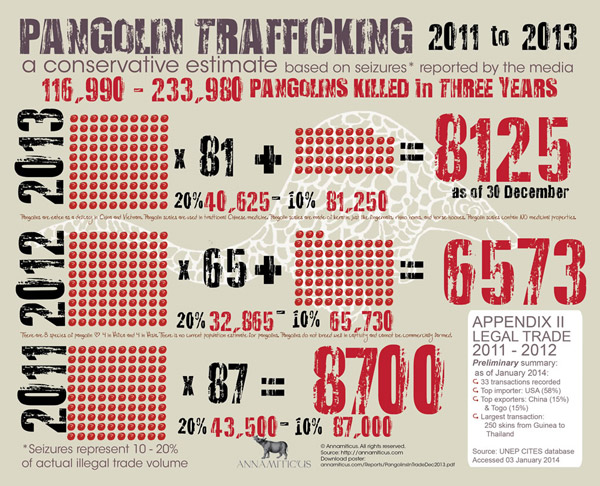
Dozens of dead pangolins seized by Chinese officials. Photo from: news.163.com
In one of the biggest pangolin trafficking cases yet recorded in China, officials confiscated 956 animals stuffed into 189 coolers this month. The dead pangolins were being carried overland in a truck, with the total haul weighing four tonnes.
The traffickers were caught at the border of Guangdong Province. If convicted, they face up to ten years in jail.
Wildlife experts believe pangolins are among the most—and perhaps even the most—trafficked animals on the planet. The animals are consumed in a number of different ways in East Asia, including China. Their meat is considered a delicacy, their scales are used in traditional medicine, and even their fetuses are eaten in a soup. The scales are made of keratin and there is no evidence that they are a curative.
According to Annamiticus, last year around 8,000 pangolins were confiscated by authorities worldwide, however experts estimate that confiscations only account for 10-20 percent of the total global trade.
Found in Asia and Africa, pangolins are unusual animals that feed on insects with a long tongue and roll into a ball when imperiled. Pangolins are so distinct they make up their own order of species, Pholidota. There are four species of pangolin in Asia, two of which are currently listed as Endangered due largely to the unsustainable and illegal trade.

Authorities confiscate nearly 1,000 dead pangolins. Photo from: news.163.com.

Officials investigate dead pangolin. Photo from: news.163.com.

Graph shows confiscation of pangolin trade from 2011-2013. Graph by: Annamiticus. Click to enlarge.
The World’s Pangolin Species
Asian species
Indian pangolin (Manis crassicaudata), Near Threatened
Philippine pangolin (Manis culionensis), Near Threatened
Chinese pangolin (Manis pentadactyla), Endangered
Sunda pangolin (Manis javanica), Endangered
African species
Giant pangolin (Manis gigantea), Least Concern
Ground pangolin (Manis temminckii), Least Concern
Tree pangolin (Manis tricuspis), Near Threatened
Long-tailed pangolin (Manis tetradactyla), Least Concern
Related articles
Chinese who eat endangered species could face over ten years in jail
(04/29/2014) It’s well known that much of the world’s massive illegal wildlife trade ends up in China, including poached tigers, pangolins, and bears. But now those who order pangolin fetuses, tiger blood, or bear bile at a restaurant or market may see significant jail time.
Six smugglers sentenced to jail time over pangolin trafficking in Malaysia
(08/20/2013) Six men have been sentenced to a year in jail after being convicted of smuggling 150 pangolins in peninsular Malaysia, reports Annamiticus. The men were also given fines totaling over $100,000.
First ever pangolin conference concludes all eight species in trouble
(07/23/2013) Demand for scales, meat, and even fetuses of pangolins have pushed all eight species of this unique mammalian order—Pholidota—toward extinction, according to the world’s first ever pangolin conference with the International Union for Conservation of Nature – Species Survival Commission (IUCN-SSC) Pangolin Specialist Group. Meeting in Singapore earlier this month, 40 conservationists from 14 countries discussed the plight of these little-known scaly mammals and how to turn around their global decline.
(04/15/2013) What do you do when you’re smuggling 22,000 pounds of an endangered species on your boat? Answer: crash into a protected coral reef in the Philippines. Last Monday a Chinese vessel slammed into a coral reef in the Tubbataha National Marine Park; on Saturday the Filipino coastguard discovered 400 boxes of pangolin meat while inspecting the ship. Pangolins, which are scaly insect-eating mammals, have been decimated by the illegal wildlife trade as their scales are prized in Chinese Traditional Medicine and their meat is considered a delicacy.
Pity the pangolin: little-known mammal most common victim of the wildlife trade

(02/11/2013) Last year tens-of-thousands of elephants and hundreds of rhinos were butchered to feed the growing appetite of the illegal wildlife trade. This black market, largely centered in East Asia, also devoured tigers, sharks, leopards, turtles, snakes, and hundreds of other animals. Estimated at $19 billion annually, the booming trade has periodically captured global media attention, even receiving a high-profile speech by U.S. Secretary of State, Hillary Clinton, last year. But the biggest mammal victim of the wildlife trade is not elephants, rhinos, or tigers, but an animal that receives little notice and even less press: the pangolin. If that name doesn’t ring a bell, you’re not alone.
New website highlights the plight of the pangolin
GA_Sekkong-HKG_199305.150.jpg)
(09/25/2012) Scaly, insect-devouring, nocturnal, and notoriously shy, pangolins are strange mammals who remain unknown to many. But they are facing a major crisis as they are stolen from the wild in East Asia to serve as meat or traditional medicine. In Asia, two of the four species are now listed as Endangered due largely to poaching. Now, a new expert group through the International Union for the Conservation of Nature (IUCN) aims to work toward better research and conservation of the world’s imperiled pangolins, starting with launching a new website, PangolinSG.
Pictures of the day: pangolins saved in Thailand from poachers
(08/06/2012) Earlier this summer, 110 Sunda pangolins (Manis javanica) were rescued by Thai customs officials from poachers in a pickup truck. While the driver of the vehicle escaped, a passenger was arrested, but released after paying a fine of $75,000, reports the NGO FREELAND Foundation.
Pangolins imperiled by internet trade–are companies responding quickly enough?
(01/24/2012) You can buy pretty much anything on the internet: from Rugby team garden gnomes to Mickey Mouse lingerie. In some places, consumers have even been able to purchase illegal wildlife parts, such as ivory and rhino horn. In fact, the internet has opened up the black market wildlife trade contributing to the destruction of biodiversity worldwide. Pangolins, shy, scaly, anteater-like animals in appearance, have not been immune: in Asia the small animals are killed en masse to feed rising demand for Chinese traditional medicine, placing a number of species on the endangered list.
Over 20,000 pangolins illegally poached in Borneo

(10/28/2010) Notebooks confiscated by the Sabah Wildlife Department (SWD) reveal that 22,000 Sunda pangolins (Manis javanica) were illegally poached from May 2007 to January 2009 in the Malaysian state in northern Borneo. The number, in fact, may be significantly higher since the logbooks didn’t cover over a third of the time period. The logbooks were analyzed by TRAFFIC, an organization devoted to combating the illegal trade in wildlife.